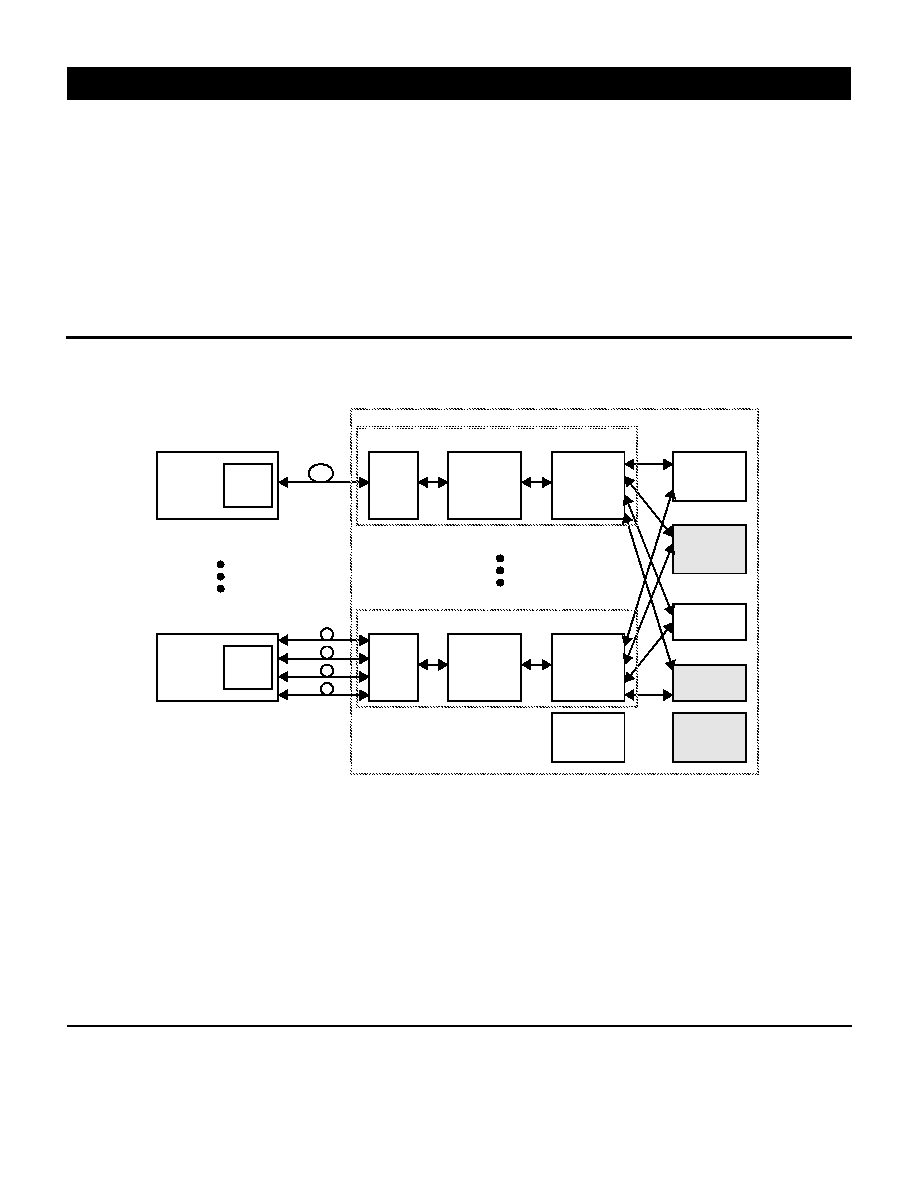
PM9311/2/3/5
Preliminary
PMC-Sierra,Inc.
Enhanced TT1
TM
Switch Fabric
ETT1TM Chip Set
PMC-2000411
PROPRIETARY AND CONFIDENTIAL TO PMC-SIERRA, INC., AND FOR ITS CUSTOMERS' INTERNAL USE
© Copyright PMC-Sierra, Inc. 2000
FEATURES
The ETT1
TM
Chip Set provides a full 32-
port crossbar-based switch fabric.
Shelves of physically separated
linecards can be attached to the switch
fabric by fiber optic links running the
Linecard-to-Switch (LCS
TM
) protocol.
CONFIGURATIONS
∑ 320 Gbit/s aggregate full-duplex
bandwidth with a typical configuration
of 32 ports of OC-192c or 10 Gbit/s
Ethernet.
∑ Each port operates at a fixed rate of 25
million fixed-length cells per second.
The user payload in each cell can be
either 64 or 76 bytes. A 64 byte cell
payload is equivalent to a 12.8 Gbit/s
line rate.
∑ Each port can be configured as:
a) 1 channel of 25 million cells per
second, appropriate for a single OC-
192c stream or 10 Gbit/s Ethernet, or
as
b) 4 channels of 6.25 million cells per
second, appropriate for a quad OC-48c
linecard.
SERVICES
∑ All configurations support four strict
priorities of best-effort traffic for both
unicast and multicast data traffic.
∑ TDM service provides guaranteed
bandwidth and zero delay variation
with 10Mbit/s per channel resolution.
Can provide Add-Drop type
functionality or ATM CBR service.
∑ Highly efficient cell scheduling
algorithm together with the use of
Virtual Output Queues and Virtual
Input Queues provides near-output-
queued performance in conjunction
with the fabric's internal speedup.
∑ Efficient support for multicast with cell
replication performed within the switch
core. Up to 4096 multicast groups per
port.
LINECARD SUPPORT
∑ Linecard-to-Switch (LCS) protocol
supports a physical separation
between switch core and linecards of
up to 200 feet/70 m.
∑ LCS provides a simple credit-based
flow mechanism to avoid cell loss due
to buffer overrun.
MANAGEMENT
∑ In-band management and control via
Control Packets. These Control
Packets are exchanged between the
linecard and the switch core, and
enable the linecards to communicate
directly with the CPU that controls the
switch fabric.
∑ Out-of-band (OOB) management and
control via a dedicated CPU interface.
Every ETT1 device has an OOB
interface that provides a CPU-based
control and diagnostics interface. A
single CPU can control every ETT1
device in a full fabric.
FAULT TOLERANCE
∑ Optional redundancy of all shared
components for fault tolerance. A fully
redundant fabric is capable of
sustaining single errors within any
replicated device without losing or re-
ordering any cells.
∑ Hot-swap support for live insertion/
removal of boards from an active
system.
ADDITIONAL SPECIFICATIONS
∑ Provides a standard five signal
P1149.1 JTAG test port for boundary
scan test purposes.
∑ 2.5V and 1.5V rails. CMOS I/Os are
3.3V tolerant (except JTAG I/Os)
∑ PM9311-UC and PM9312-UC are in a
1088 ceramic column grid array
(CCGA) package. PM9313-HC is a
474 ceramic ball grid array (CBGA).
PM9315-HC is a 624 ceramic ball grid
array (CBGA).
DEVICE CONFIGURATION
The following illustration shows how the
ETT1 devices are configured to create a
complete fabric. Many instances of each
device may be needed in a fabric.
Shown are two fabric ports; each port
would be connected to its own
linecard(s). While every fabric port is full-
duplex, the illustration only shows the
ingress stream for the left port and the
egress stream for the port on the right.
The linecard sends cells to the ingress
queues within the Dataslice devices. The
EPP observes their arrival and issues
requests to the Scheduler device. At
some later time, the Scheduler will issue
a grant back to the EPP. On receipt of
the grant, the EPP instructs the
Dataslice to send the cell at the head of
the relevant ingress queue to the
Crossbar. The cell passes through the
Crossbar and is stored in the appropriate
queue at the egress Dataslices. The
egress EPP then instructs the Dataslices
to send the cell to the destination
linecard.
ETT1
TM
DEVICE CONFIGURATION
Scheduler
Enhanced Port Processor
Dataslice
data cell flow
control flow
Dataslice
PM9311-UC
PM9315-HC
PM9313-HC
PM9313-HC
Enhanced Port Processor
PM9315-HC
1 of 32 ETT1 Ports
1 of 32 ETT1 Ports
Ingress
Flow from
Linecard
Egress
Flow to
Linecard
LCS
Protocol
Interface
LCS
Protocol
Interface
Crossbar
PM9312-UC
Crossbar
PM9312-UC
Flow Control

Head Office:
PMC-Sierra, Inc.
#105 - 8555 Baxter Place
Burnaby, B.C. V5A 4V7
Canada
Tel: 604.415.6000
Fax: 604.415.6200
Enhanced TT1
TM
Switch Fabric
To order documentation,
send email to:
document@pmc-sierra.com
or contact the head office,
Attn: Document Coordinator
All product documentation is available on
our web site at:
http://www.pmc-sierra.com
For corporate information,
send email to:
info@pmc-sierra.com
PMC-2000411
© Copyright PMC-Sierra, Inc.
2000. All rights reserved.
March 2000
ETT1, Enhanced TT1, and
LCS are all trademarks of
PMC-Sierra, Inc.
PROPRIETARY AND CONFIDENTIAL TO PMC-SIERRA, INC., AND FOR ITS CUSTOMERS' INTERNAL USE
Preliminary
PM9311/2/3/5 ETT1TM Chip Set
SYSTEM CONFIGURATION
The following illustration shows a
complete switch, with 32 linecards
connecting to the 32 port fabric. As
shown, fiber links are used to inter-
connect the distant (up to 200 feet)
linecards to the fabric.
Alternatively, linecard silicon can
interface directly to the ETT1 devices, if
sufficient board space, power, thermal
regulation, etc., is available.
APPLICATIONS
∑ ATM switches with 32 ports of OC-
192c, or up to 128 ports of OC-48c, or
combinations thereof.
∑ SONET Add/Drop Muxes.
∑ IP switches with 32 ports of 10Gbit/s.
∑ Any combination of the above.
SYSTEM CONFIGURATION
Redundant
Crossbar
EPP plus
6 or 7
Dataslices
(14 or 16)
Redundant
(14 or 16)
Crossbar
Scheduler
Scheduler
EPP plus
6 or 7
Dataslices
SerDes
(12 or 14)
CPU
Redundant
CPU
E/O
and O/E
OC-192
E/O
and O/E
Fiber
ETT1 Fabric
SerDes
(12 or 14)
E/O
and O/E
Quad OC-48
E/O
and O/E
Fiber
Fabric Port 1
Fabric Port 32
Linecard
Linecard

